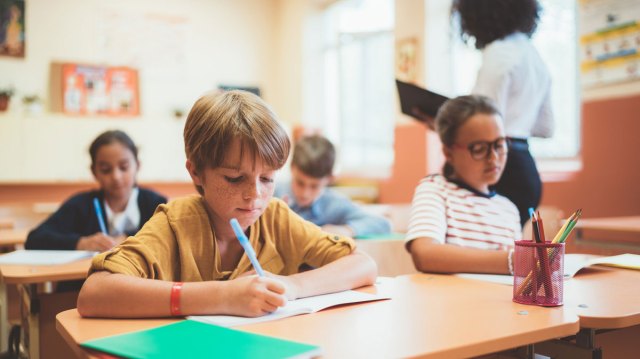With the new school year right around the corner, it’s about time to start prepping everything your child will need to succeed, like a cool new backpack, pencils, a lunchbox, etc. Additionally, you’ll want to think about what teachers should know about your child right off the bat. This may sound self-explanatory, but there is such a thing as TMI when it comes to spilling the beans about your kiddo.
We spoke to teachers and education experts about what you should keep to yourself at those beginning-of-the-year meets and what teachers should know about your child.
Things teachers don’t want to hear about your child
Avoid using labels.
It may roll off the tongue to tell a teacher, “My child can be lazy,” or “They can be difficult,” to prepare them for what lies ahead. However, you’re better off leaving those labels at the door. Chris Cybulski, a principal at Shepard Middle School in Deerfield, IL, points out that “Such labels can create biases and hinder the teacher’s ability to form an unbiased opinion about the child. Instead, focus on sharing constructive and objective information about the child’s learning style, strengths, and areas where they may need additional support.”
Don’t compare your child to others.
You don’t want to share comparisons between your child and their sibling, neighbor, friend, etc. “It’s irrelevant (and possibly damaging) to use another person as a metric by which you evaluate your child’s success, so avoid sharing such analysis with their teacher, whether in praise or frustration. Instead, maintain an open mind throughout the year, which allows you to take positive feedback about your child to heart and to empower them to set their own goals for growth,” says Linda Louis, senior director of curriculum at BASIS Independent Schools.
Unsuitable or sensitive information.
Establishing appropriate boundaries and protecting sensitive or confidential information that does not relate to your child’s education needs is paramount in a parent/student and teacher relationship and data. According to Dr. Kellie Kopach, an educator at Deer Path Middle School in Glenview, IL, “Respecting privacy while keeping information relevant encourages professional relations between teachers and their pupils as a result. Parents can build positive and constructive partnerships with teachers by withholding certain types of information about their child’s education and growth.”
Excessive demands and expectations.
It’s normal to have expectations for the teacher and your child during the school year. However, this is only helpful to a degree. “While communicating expectations to teachers is essential, overwhelming them with unrealistically high demands or expecting special treatment for your child could strain teacher-parent relations and reduce collaboration,” says Kopach.
Related: 16 Things Parents Don’t Need to Worry About (According to Teachers)
Things teachers should know about your child
Medical conditions
Your child will spend the majority of their time at school for the next nine months, so teachers should be well versed on their medical conditions in case issues arise. Patti Adams, a current middle school special education teacher in NYC with 30+ years of experience, says this is one of the most important things parents should tell their teachers.
This includes physical health issues and mental health-related concerns (anxiety, depression, etc.). “Last year, I had a student with anxiety, and he missed a lot of school because of it. If I would have known, then I could have reached out to the parents to see if there was anything else I could do to make the classroom a less anxiety-provoking environment for the student,” adds Adams.
Additionally, Kopach adds that allergies, medical conditions (diabetes, asthma, etc.), and prescription medication requirements needed during school hours must also be communicated to both the teacher and school nurse so the best care can be provided to the child in an accommodating and caring manner.
Learning style
Every child learns differently, and not one method will be successful for every child. “Parents should provide information on how their child learns best and let teachers know about any specific needs their child has that could be a barrier to success. By sharing this information early, parents help teachers tailor their instructional approaches and provide appropriate support to foster a more effective learning experience for the student,” says Cybulski.
Whether your child is a visual, auditory, or tactile learner, this is information you should immediately tell a new teacher at the beginning of the school year.
Major life changes
The topic of major life changes is at the top of the list when it comes to what teachers should know about your child. “Informing teachers of significant life events such as a recent move, divorce, or loss within the family can enable us to stay aware of potential emotional or behavioral changes that might impact a student,” says Kopach. “While we don’t need to know specific details, providing this information helps us better understand and connect to the whole student.”
Goals for the child
Parents should set goals for their children inside and outside the classroom each academic year. “While this may include reading, writing, and math computation goals, it could also be that the student is working on a sport or hobby, completing a service project for a church group or scout troop, or learning a new instrument,” says Cybulski. “Providing this information helps connect the teacher to the student’s interests beyond school and can help build a greater network of support for the student.”
